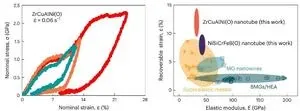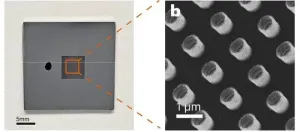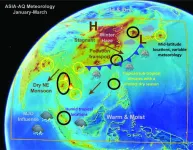A new study draws on a field of science known as proteogenomics to try to improve the outlook. In a paper published Jan. 16 in Cell Reports Medicine, scientists report new findings about how drug resistance in some AML patients develops and how doctors might someday stop or slow the process.
The research comes from a team of researchers from the Department of Energy’s Pacific Northwest National Laboratory and Oregon Health & Science University. For nearly a decade, OHSU and PNNL researchers have worked together to fill a critical gap in our knowledge of how cancer and other diseases happen. At one end of the spectrum, our body’s genes can go awry, creating mutations that can be harmful or deadly. At the other end of the spectrum is a real person whose life is affected or even ended as a result.
What happens in the middle, between the genes and the person’s health?
The answer: a dizzying number of complex molecular processes that scientists are grappling to understand. At the center are the body’s proteins and a field of study known as proteogenomics.
Sorting the data with machine learning
The PNNL-OHSU team is studying thousands of proteins that could play a role in AML. Proteins are the body’s molecular workhorses, ferrying nutrients and other supplies back and forth between cells, turning genes on or off, and maintaining dozens of basic body processes. Even though genes get the glory, they do little directly to keep our bodies going. That’s the job of proteins. For nearly 20 years, study author Karin Rodland of OHSU, formerly of PNNL, has been a pioneer exploring the role of proteins in health and disease, building a program with OHSU and PNNL colleagues to study AML.
In the latest study, a team led by Sara Gosline, a data scientist and computational biologist at PNNL, did an exhaustive study of the protein activity in 210 patients with AML. Altogether, the team measured levels of nearly half a million pieces of proteins from more than 9,000 proteins in patients’ blood samples. The team combined those findings with extensive data already known about the disease—the genes and mutations involved, the molecular messengers that indicate which genes are active, and the effects of 46 drugs on AML patients, along with information about how the disease progressed in those patients.
“We were able to look at patterns of drug responses in hundreds of people by including protein and gene measurements together, and this gave us a level of detail that hasn’t been possible in prior studies,” said Gosline. “This is a great example where we are able to put our growing knowledge of protein signaling and machine learning models to benefit patients in the future.”
Gosline and colleagues, including first author James Pino of PNNL, deployed artificial intelligence, using several machine learning algorithms to make sense of the data.
Beating drug resistance
While the study yielded a load of data about what happens in the body of an AML patient, one finding stood out, pointing to a possible way to sidestep or delay drug resistance for some patients.
The team showed that treatment with quizartinib, approved last year to treat AML, can shift how cancer cells respond to other drugs often used in combination to treat patients.
Specifically, the team found that when patients on quizartinib stop responding to venetoclax, doctors might consider switching to another drug, panobinostat. It’s an example of how proteogenomic information could alter the roadmap that doctors use to navigate which medications patients receive at different stages of the disease.
“The difficulty is that cancer keeps evolving,” said Gosline. “You hit the tumor with one drug and the tumor changes. This is what happens when patients experience drug resistance and the medicines stop working. Our study helps us understand exactly how this happens and what might be done in response. Which medication is best to turn to?”
AML poses a particular challenge, said study author Cristina Tognon at OHSU.
“When you treat a tumor with a drug, you are putting pressure on the tumor cells as they try to figure out a way to escape that pressure and survive. It’s a big problem in AML patients. What’s even more difficult is that in AML, there are many mutations at work; the disease doesn’t come in just one flavor,” said Tognon, who is an associate research professor and scientific director of the Druker Laboratory at OHSU.
Ultimately, the team focused on 147 proteins and specific molecular locations known as phosphosites that play a key role in determining which proteins are turned on and which are off.
Using just the protein data, the team sorted the samples into four distinct groups that predicted how the patients fared. Patients whose samples placed them in one of the groups had a better prognosis than the others, surviving far more than five years. Doctors hope that this type of information will eventually become available in the clinic. That would allow some patients who do not need aggressive therapies with severe side effects to avoid them while assuring that patients who have the worst prognosis are treated as aggressively as possible.
“There is potential for clinical applications to be derived from this work, for example, diagnostics, such as protein biomarkers to predict responses to therapies, and the design of new drug combinations that might outperform current ones,” said OHSU’s Jeff Tyner, professor of medicine at the OHSU School of Medicine and Knight Cancer Institute.
The work is the latest of more than 200 studies that have looked at protein activity in many forms of cancer, including colon, brain, endometrial, brain, blood and ovarian cancers. An OHSU-PNNL team
discussed the emerging role of proteins for treating patients with precision medicine in a recent article in the Annual Reviews of Pharmacology and Toxicology. More and more, scientists are using proteomics—the study of proteins—to bridge the gap between genomics (the study of genes) to phenomics (phenotypes or observable characteristics).
PMedIC: an OHSU-PNNL collaboration
OHSU and PNNL scientists work collaboratively on many projects. OHSU brings outstanding clinical expertise about disease as well as extensive laboratory knowledge and is a world-class center for new treatments of leukemia. PNNL offers an unparalleled ability to measure tiny amounts of important molecules in great detail. Much of this work happens through the Pacific Northwest Biomedical Innovation Co-Laboratory, or PMedIC, a joint research collaboration between the two organizations. Through PMedIC and other collaborations, the institutions have made discoveries about several diseases, including Alzheimer’s disease, COVID-19, and the Zika virus.
At PNNL, additional authors include Camilo Posso, Michael Nestor, Jamie Moon, Joshua Hansen, Chelsea Hutchinson-Bunch, Marina Gritsenko, Karl Weitz, Jason McDermott, Tao Liu and Paul Piehowski. Other authors from OHSU include Sunil Joshi, Kevin Watanabe-Smith, Nicola Long, Brian Druker, Anupriya Agarwal and Elie Traer.
This work was supported by the National Cancer Institute’s Office of Cancer Clinical Proteomics Research (CPTAC U01CA271412), the ARCS Scholar Foundation, a Paul & Daisy Soros Fellowship, the National Cancer Institute (F30CA239335, R01 CA229875-01A1), the American Cancer Society (RSG-17-187-01-LIB), the National Heart, Lung, and Blood Institute (R01 HL155426-01), the Alex’s Lemonade Stand Foundation/RUNX1 Research Program, and the EvansMDS Foundation.
# # #
END







